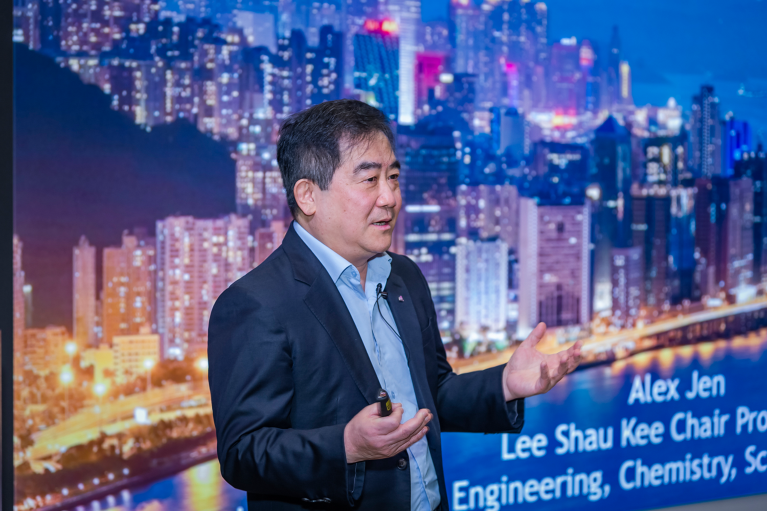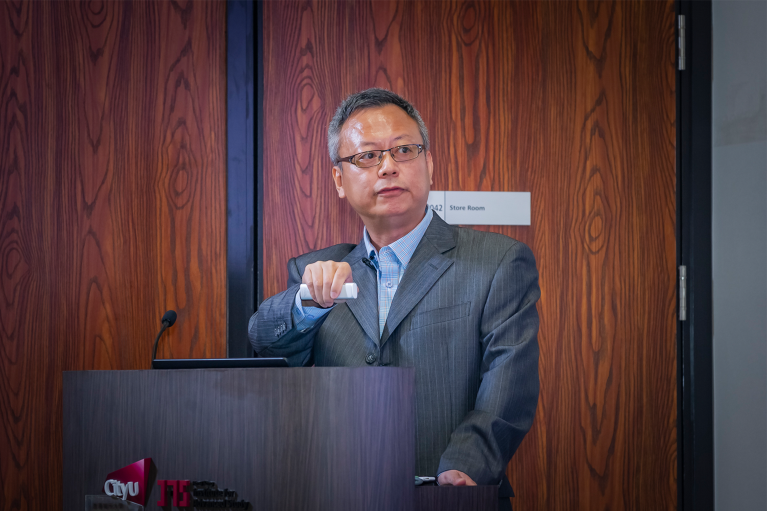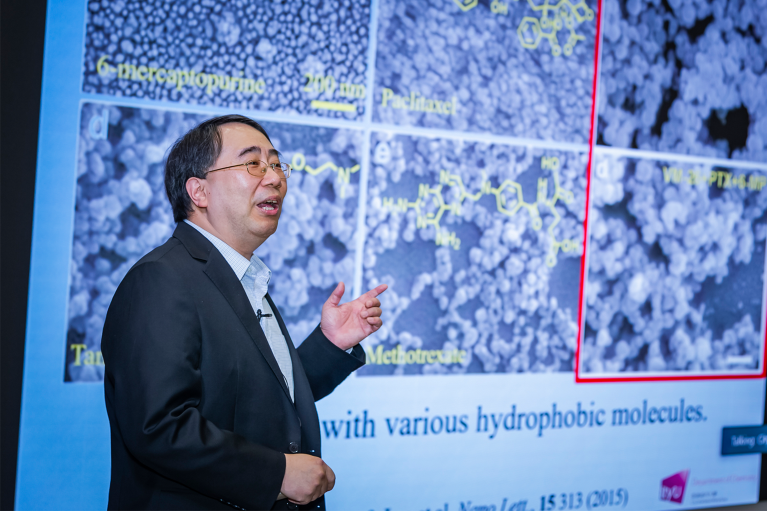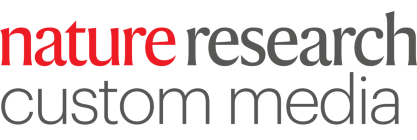Cross-disciplinary advances brought about by new discoveries in chemistry have accelerated innovation in biomedicine, energy and environment research. For the Distinguished Lecture Series on Chemistry of the Hong Kong Institute for Advanced Study (HKIAS) at the City University of Hong Kong (CityU), three world-leading professors have shared their latest research results, attracting an online attendance of more than 1,000 experts and students. The lecture series features the latest significant ideas in chemistry, materials sciences, and other disciplinary advances to reveal understandings about the natural world.
Powering the world with printable solar cells
Alex Jen, Lee Shau-Kee Chair Professor of Materials Science, and Chair Professor of Chemistry and Materials Science at CityU, who was selected as one of the top 10 researchers in the perovskite solar cell (PVSC) field by the Times Higher Education in 2018, introduced the extensive research into energy-saving innovations by his lab.

Alex Jen discussed ‘Printable Solar Cells for Transformative Clean Energy and Sustainable Society’ on 3 March 2021
“The potential for solar power is unrivalled and one of the most reliable, compared to other renewable energy sources,” said Jen. “The question is: do we have enough devices to store or generate the power?”
Compared to traditional solar cells, which have longer energy payback time and lower efficiency, organic solar cells (OSC) and perovskite solar cells (PVSC), Jen’s two main focuses, create the possibility of new uses including printable cells, wearable gadgets, and portable power sources.
“Developing economical production of printable cells, and enhancing scalability of implementation of the OSC, are critical to a successful green economy,” said Jen. “I hope that one day we can print the solar cells just as easily and frequently as printing newspaper.”
Accelerating phase engineering of nanomaterials
In the second talk of the series, Hua Zhang, Herman Hu Chair Professor of Nanomaterials at CityU, highlighted new approaches to synthesizing nanomaterials with different crystal phases, offering varying properties and functionalities.

‘Phase Engineering of Nanomaterials’ was the subject of Hua Zhang’s lecture on 31 March 2021.
“Nanomaterial synthesis traditionally involves stringent control of composition, morphology, size, dimension and facet, along with the demand for high temperature and extreme pressure to transform the elements,” said Zhang. “Material chemists have proposed alternative methodologies, and we have made significant advances with new approaches in the phase control of nanomaterials, especially in the unconventional crystal phases and amorphous structures.”
“Phase engineering of nanomaterials, while still under development, enables diverse applications including catalysis, optoelectronic devices, surface-enhanced Raman scattering, waveguide, biosensing, clean energy chemicals, among other potential real-world benefits,” Zhang said.
Employing charge-transfer complexes for diverse applications
Concluding the lecture series was Chun-Sing Lee, Head of Chemistry Department and Chair Professor of Materials Chemistry at CityU, discussing charge-transfer complexes (CTCs).

Chun-Sing Lee gave the lecture ‘Charge-Transfer Complexes and their Applications’ on 8 April 2021.
“CTCs can be understood as the substantial charge transfer between electron-donating and electron-accepting molecules, which enables new and unconventional properties such as metallic conductivities for organic materials.”
He introduced the characteristic signatures of CTCs, such as red-shifted, and broadened emission and absorption, which can enhance organic solar cells and LED devices.
“Beyond optoelectronics, our team has been dedicated to investigating biomedical applications with exciting prospects,” he said.
Spearheading academic excellence
Supported in part by the Kwang Hua Educational Foundation, HKIAS has devised a new framework for engaging stakeholders to bring forth new research findings, and organized events in new formats to bring together academic communities beyond geographical boundaries. This lecture series, for example, stems from HKIAS’s promotion of diversity in disciplinary and methodological approaches.
The three speakers of this lecture series, as well as other full-time faculty members at CityU (140 in total), are listed among the top 2% of the world's most highly cited scientists, according to metrics compiled by Stanford University. In addition, eight HKIAS members are also listed, reflecting its excellent academic stature.
Sir Colin Blakemore, Philippe G. Ciarlet, Way Kuo, Chain-Tsuan Liu, Jian Lu, and David J. Srolovitz (listed alphabetically), Senior Fellows of HKIAS; Tei-Wei Kuo, Former Visiting Fellow of HKIAS; and Jacob C. Huang, Executive Director of HKIAS are among those eminent scholars.
“Our world-recognized platform for interdisciplinary research at HKIAS continues to reward interdisciplinary research and education, stimulating new thinking for new research directions, while bringing new insights to benefit society, technology, and scholarship,” said Huang.



 New frontiers in neuroscience
New frontiers in neuroscience
 Collaborating across borders and disciplines
Collaborating across borders and disciplines
 A dynamic centre of advancement
A dynamic centre of advancement
 Making Hong Kong a hub for science and technology innovation
Making Hong Kong a hub for science and technology innovation
 Systems for resilience and strength
Systems for resilience and strength